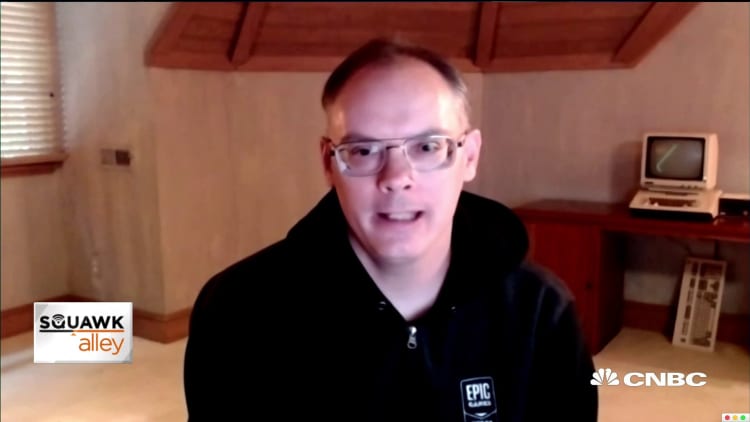
Epic Games CEO Tim Sweeney said that Apple's App Store is a "absolute monopoly" and Google's control of Android "essentially stifles competing stores" on CNBC's Squawk Alley on Friday, adding his voice to a chorus of detractors ahead of the CEOs testifying in Congress in the coming weeks.
Privately held Epic Games is the publisher and developer of Fortnite, which is consistently one of the apps that makes the most money on mobile app stores. But because Fortnite's in-app purchases are digital goods like character outfits, both Apple and Google take a 30% cut of the game's revenue according to store policies.
"Apple has locked down and crippled the ecosystem by inventing an absolute monopoly on the distribution of software, on the monetization of software," Sweeney told CNBC's Julia Boorstin.
In 2019, the company released the Epic Game Store, a platform for distributing software on Windows and Mac computers, in which the primary selling point to game makers is that it takes a lower 12% fee from sales.
But the Epic Game Store has yet to launch on iPhones, because Apple has strict guidelines preventing competing software stores on the App Store.
"They are preventing an entire category of businesses and applications from being engulfed in their ecosystem by virtue of excluding competitors from each aspect of their business that they're protecting," Sweeney said.
In addition to Fortnite, Epic makes the Unreal Engine, software that makes it much easier to make 3D-based video games. The company is worth $18 billion after Sony invested $250 million earlier this month. Tencent is also a major shareholder.
Google, too
Sweeney said in June that the company still plans to bring the Epic Games Store to Android. In the CNBC interview on Friday, he pointed out that Google has rules complicating that launch as well.
"Google essentially intentionally stifles competing stores by having user interface barriers and obstruction," Sweeney said.
Previously, Epic Games published Fortnite as a "side-load" install that did not require downloading through the Google Play app store, enabling the company to sidestep Google's 30% cut. But the installation process was not simple, hurting adoption, and Google eventually accused Fortnite of having a security flaw in its installer. Fortnite launched on Google Play earlier this year.
Ultimately, though, one of Sweeney's biggest complaints centers around the 30% fee both Apple and Google take from in-app purchases. On iPhones, users are required to pay for digital goods through Apple's App Store payment system. Apps that circumvent the mechanism could be removed from the App Store. Google requires developers to use Google Play billing as well. Other apps that make a lot of money through apps, like Match Group, publisher of Tinder, have also publicly criticized the 30% fee.
Earlier this week, Apple released paid research that suggested that its iPhone App Store was not materially different in terms of practices or the fees from competitors, including Google.
"If every developer could accept their own payments and avoid the 30% tax by Apple and Google we could pass the savings along to all our consumers and players would get a better deal on items. And you'd have economic competition," Sweeney said.


